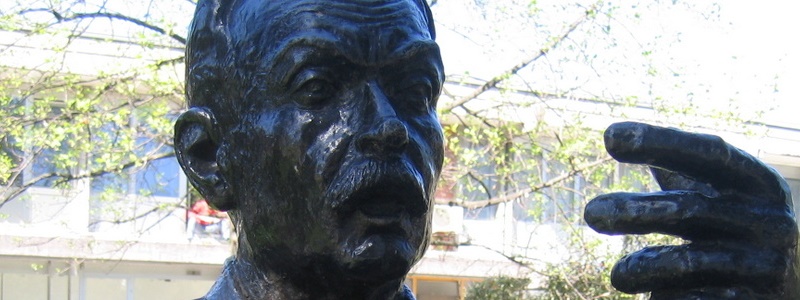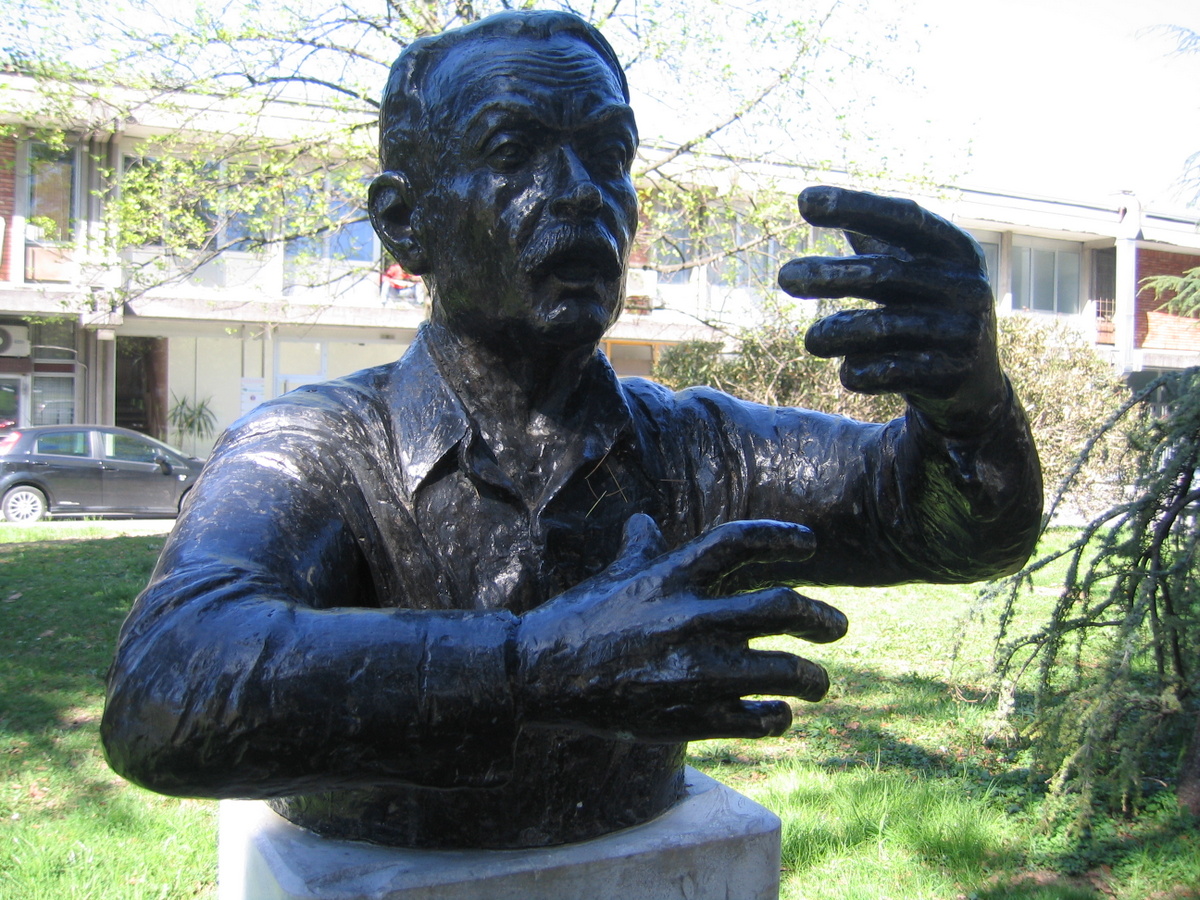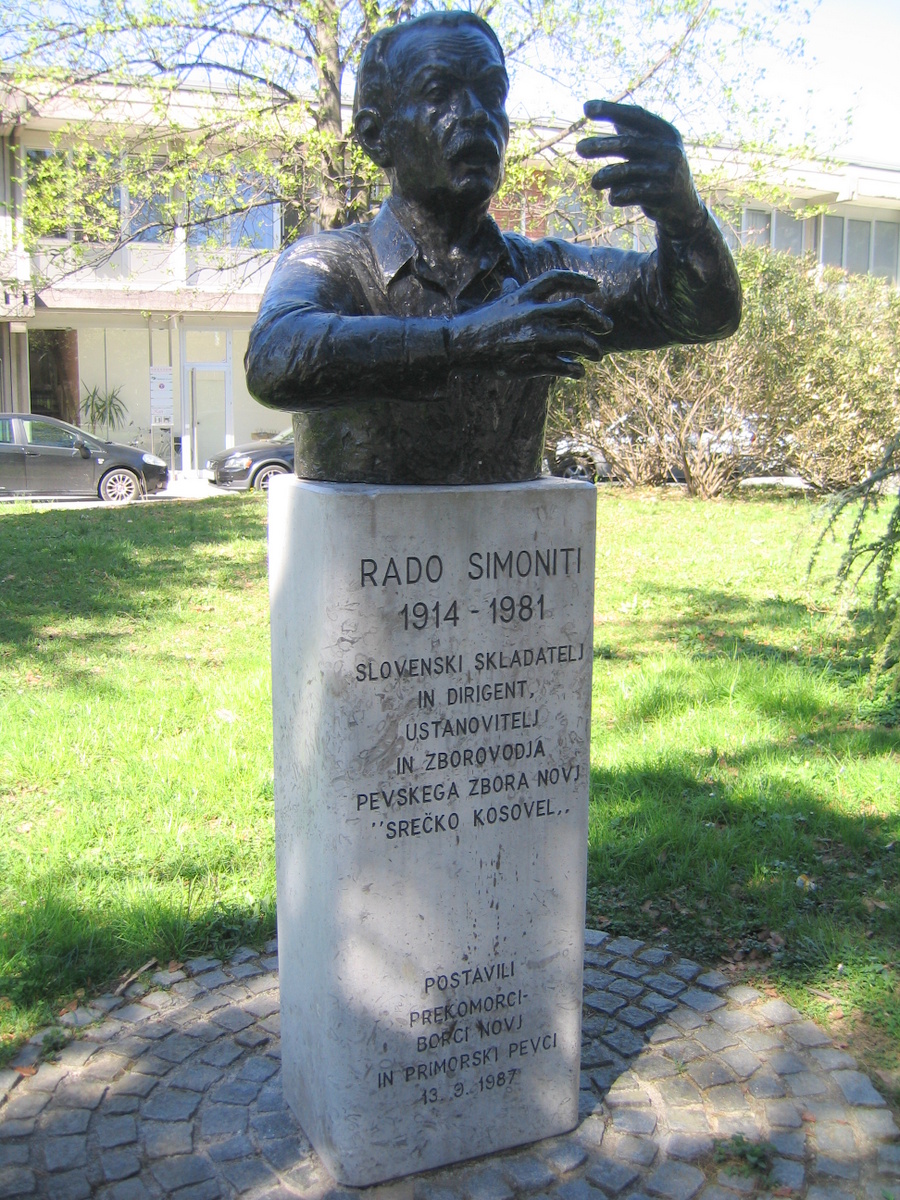In 1987, a bronze statue of Rado Simoniti by Negovan Nemec was mounted on a stone column.
Rado Simoniti
The enduring legacy of Rado Simoniti (1914–1981) renders the prolific composer and conductor, popularly known as “the songsmith of Goriška brda”, one of the leading figures of Slovenian music tradition. His impressive output includes choral music, lieder, cantatas, opera Partizanka Ana (Partisan Ana), and the popular song Vstajenje Primorske (The Rise of the Littoral), which has acquired the status of a folk song and is the unofficial anthem of the Slovenian Littoral. Committed to asserting national identity, he formed the Srečko Kosovel Partisan Choir, which toured Slovenia and Europe with Simoniti – the choir’s influential choirmaster and composer of numerous Slovenian partisan songs – at the helm. Permeated with a sense of folk melodiousness, Simoniti’s extensive body of choral music includes around 300 works, of which 200 are original compositions and 100 adaptations of folk songs.
Siminotti’s homelife and school were imbued with choral music, as he sang in the choir of the Collegium Marianum Boys’ School in Ljubljana and was tutored by his father Anton Simoniti, organist and choirmaster of several choirs in the Goriška region. Simoniti attended the Secondary School of the Conservatory of Music in Ljubljana and studied organ with Stanko Premrl. Having completed his secondary education, Simoniti taught at the Municipal Music School in Split, Croatia, between 1937 and 1939, and conducted the Choir of the Tomislav Music Society. The new milieu sparked his interest in the folk melodies of the wider historical region of Dalmatia.
Having returned to Ljubljana, he pursued and advanced his musical career as a choral director. He was choirmaster at the Slovenian National Theatre (1939–1943) and at the same time studied conducting under Danilo Švara at the newly-established Academy of Music in Ljubljana. At the Academy, he also studied composition under the tutelage of two of the foremost Slovenian music authorities, composers Lucijan Marija Škerjanc and Marijan Lipovšek. In 1939, Simoniti was appointed Ljubljana Opera’s first chorus master, and between 1948 and 1958 served as the conductor of the Slovenian Philharmonic Choir. He was the choirmaster of a number of prominent choirs, including the Emil Adamič Teachers’ Choir, the France Marolt Academic Choir and the Krakovo-Trnovo Choir.
After graduating in conducting with a production of Verdi’s Traviata, Simoniti also built a career in opera. The influence of numerous stagings of the standard Italian verismo repertoire under his baton can be easily traced in Simoniti’s composing style, in which the flowing melody of verismo style formed the core of his musical idiom.
He dedicated himself to writing partisan songs and folk song adaptations in 1943, the year he joined the cultural group of the 20th Commando Brigade Ljubljana, the shock troops with whom he carried out raids on the Island of Vis and in southern Italy. It was there in 1944 that he completed Naša pesem (Our Song), his first collection of national and international songs of resistance. Thereupon, Simoniti formed a partisan choir named after the poet Srečko Kosovel, which performed partisan songs in a range of venues, from Dalmatia to the Slovenian Primorska (Littoral) and Štajerska (Styria) regions. The choir also toured France and Belgium.
Simoniti’s vocal music – the first Slovenian partisan opera, lieder and choral pieces – is recognised as his chef-d’oeuvre. His output of 600 works also includes two cantatas: Kolednica mladinskih brigad (The Carol of Youth Brigades) – a musical setting of a poem by Oton Župančič – and Na kozlovem robu (At Kozlov rob), based on lyrics by Alojz Gradnik. Displaying all the distinctive qualities of Simoniti’s musical texture (most notably the smooth cantabile style of bel canto and tendency towards the verismo style), the opera Partizanka Ana (Partisan Ana) features a representative tragic heroine who does not lament her sad fate, but voices hope for a bright future in socialist realism. Reflecting influences of romantic lieder, Simoniti’s partisan songs for solo voice and piano were musical settings of poems by Slovenian authors, particularly Matej Bor, Smiljan Samec and Srečko Kosovel, and enjoyed great popularity. Many of his lieder, notable examples include Pomlad, Še veš …, Na Krasu, Po dežju, Sanjala si o vrtnicah rdečih and Ples v rdečem (Spring, Do You Remember…, At the Karst, After the Rain, You Dreamt of Red Roses, and Dancing in Red) have approached the status of folk songs, as have some of his choral pieces.
Particularly noteworthy among his choral output are the compositions Tito and Pesem o Titu (Song about Tito) for large ensembles, Starka za vasjo (Old Woman outside the Village) for mixed choir, Čriček na vrtu (Cricket in the Garden) for female choir, and the male choir pieces Le vkup, le vkup, uboga gmajna (Come Together, Come Together, You Poor Commons) and Na oknu glej obrazek bled (Behold a Pale Face in the Window).
Maia Juvanc


